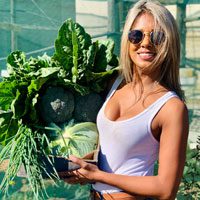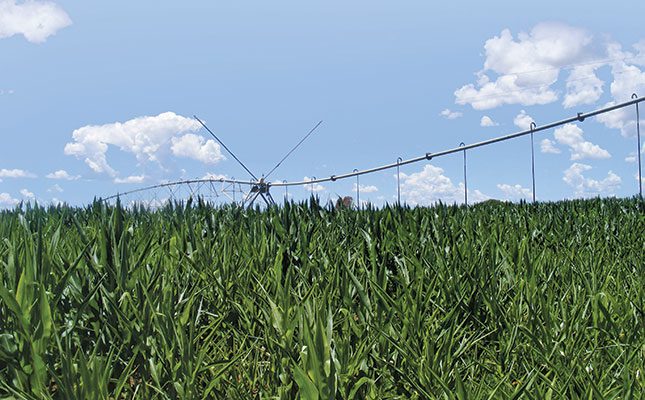Thashni Manjoo
Farm Manager, Roadway farms (vegetables)
Albert Falls, KwaZulu-Natal

What inspired you to get involved in agriculture?
I grew up on a family farm in Albert Falls, KwaZulu-Natal (KZN). I was a rough-and-tumble kid, always covered in dirt from spending most of my time outside. My late father was the most patient, kind, informative tutor when it came to the workings of the world. He taught me how much of the world is alive, and how it’s our job to respect and protect the things that humans usually take advantage of. When I grew up I studied marketing and moved to Johannesburg, and had an active digital marketing career for 10 years.
When the 2020 pandemic hit, I felt the need to come back to Pietermaritzburg to look after my family on the ground here. It was around the same time that my dear friend, Shakti Satyapal, took over his father’s vegetable farm, Roadway Farms, also in Albert Falls. I started volunteering, which very quickly transformed into a full-time job and a pivotal career change.
Please explain your role in the business.
I am Shakti’s 2IC on the ground. I help manage the farm and the staff on a daily basis. I am involved from the planning phase to the execution for harvest, planting, regenerative agriculture initiatives, staff management, and everything in between. I also run deliveries when need be as well as assist and run the sales, marketing and social media platforms for the business. These platforms have done increasingly well for us. Shakti and I have been featured in multiple newspaper articles, I have been on two television shows (Dining and Vibing in SA and Clover Krush’s Unlock Your 100%). We believe in sharing our message and learnings as we go and this lives on through our marketing.
What are the biggest challenges facing women in agriculture?
It’s been tough to be taken seriously as a young woman in agriculture. It’s weird, the labour force for agriculture is majority female, however the industry is still dominated by men. I have been incredibly lucky that Shakti, his father and the entire team have done everything in their power to uplift and empower me. I was taught that your attitude is your best ally; not being taken seriously in the industry at first only means that I needed to work harder. My biggest challenge is not gender-specific, it is that of climate change. The erratic, extreme weather patterns have caused devastation and destruction on a mass scale for us.
If you were given R30 million to invest in the industry, what would you spend it on?
Roadway Farms is a vegetable farm in transition to a regenerative agriculture future, and this means a huge focus on soil health. With everything we do on the farm, we apply the regenerative principles as much as we can while in this transitional period. We hope to create an agribusiness of the future that can be used as a blueprint for other farmers to create a more sustainable farming model. With R30 million, the immediate priority would be to stabilise the business financially.
Due to the consecutive setbacks that the farm has suffered (COVID-19, KZN riots and looting, extended rainy periods, floods, economic volatility and load-shedding) we are now in a fragile financial state and in dire need of funding to ensure continued employment of all our staff members and to keep the farm gates open for business. Therefore, our primary short-term goal is to unlock the full potential of the farm, so that we can optimise on value creation for the business, and our care-holders. The initial investment would go towards upgrading machinery, purchasing implements, building infrastructure, investing in our soil biology, increasing irrigation capacity, and maximising cultivation of our fields.
We also want to share our learnings and story in the hopes of bringing more public and governmental attention to agriculture and what we do. This is our very best opportunity and hope of minimising the catastrophic effects of total climate destabilisation.
What does the future look like?
My future plans are aligned with the above to bring Roadway Farms to being a strong, reputable agribusiness of the future. My personal goals are to educate, empower and assist other young females on the cusp of the industry. I would not be here if I did not have individuals willing to teach me; education and giving back is a huge part of my own and the farm’s ethos. I have funnily developed the nickname ‘Farm Barbie’ on the farm. I would like to grow this persona as an ambassador for young women in agriculture. Farm Barbie can have pretty nails and pretty hair, but she is not afraid to get her hands dirty and get deep into whatever work needs to be done.
What is some advice you can offer new and emerging women farmers?
There are loud voices telling young women what they can and can’t do. My advice is to listen to your gut, your heart, and your mind together. If your intention is good, there is nothing stopping you. It’s going to take a lot of work, hours, blood, sweat and tears, but the reward is unimaginable. We are healthy food suppliers, Earth protectors, and necessary for society to function. Our role is an important one, so if you believe your hands are green, be resilient, be strong, be loud, and fight for what you want. |

